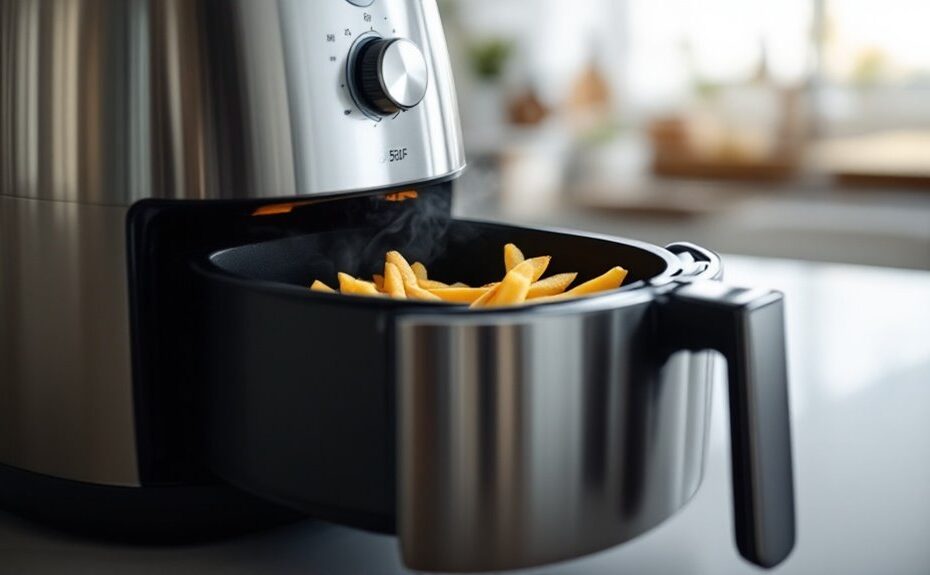Imagine your air fryer suddenly stops heating, leaving your dinner half-cooked and your plans disrupted. You've checked the power cord, but the issue persists—what's next? From unevenly cooked meals to unexpected smoke or strange noises, air fryers can present a range of problems that disrupt your routine. Understanding the root cause and knowing how to address it can save you time and frustration. Whether it's a simple fix or something requiring professional attention, troubleshooting these issues effectively guarantees your appliance stays reliable. But what if the problem isn't as straightforward as it seems? Let's explore the possibilities.
Key Takeaways
- Check the power source and ensure the cord is securely plugged in, and inspect for visible damage or loose connections.
- Avoid overcrowding the basket and preheat the air fryer for even cooking, shaking or flipping food halfway through.
- Clean the interior regularly to prevent smoke or burning smells caused by excess oil or grease buildup.
- Inspect and secure loose components, and ensure the fan is free of debris to address unusual noises.
- Refer to the user manual for error codes, reset the unit, and clean the control panel for display issues.
Air Fryer Not Turning On
If your air fryer isn't turning on, the first step is to check the power source. Make sure the power cord is securely plugged into both the outlet and the air fryer. Inspect the cord for visible damage, such as fraying or cuts, as power cord issues can prevent the unit from receiving electricity. Test the outlet by plugging in another device to confirm it's functioning. If the outlet works, examine the air fryer's power button. A faulty power button may not engage properly, so press it firmly and listen for a click. If the button feels loose or unresponsive, it might need replacement. Avoid using extension cords, as they can cause insufficient power delivery. If these steps don't resolve the issue, consult the user manual or contact the manufacturer.
Uneven or Under-Cooked Food
When your air fryer produces uneven or under-cooked food, it's often due to improper loading or incorrect settings. Start by ensuring proper food placement—avoid overcrowding the basket to allow hot air to circulate evenly. Spread items in a single layer, leaving space between pieces. If cooking multiple batches, rotate or shake the basket halfway through to promote uniform cooking. Next, verify the cooking time and temperature settings. Adjust the time based on the food's thickness and quantity, and preheat the air fryer if required. For denser foods, consider lowering the temperature and extending the cooking time to prevent under-cooking. Always refer to the recipe or manual for guidance. Regularly check food during cooking to avoid over- or under-cooking, and make adjustments as needed.
Strange Noises During Operation
Strange noises during air fryer operation can indicate mechanical issues or improper use, but they're often easy to diagnose and resolve. Start by checking for loose components, such as the basket or tray, and make sure they're securely in place. If the noise persists, inspect the fan or heating element for debris, as food particles can cause rattling or grinding sounds. For noise reduction tips, place the air fryer on a stable, flat surface to minimize vibrations. Soundproofing methods include using a silicone mat underneath the unit to dampen noise. Avoid overloading the basket, as unevenly distributed food can create excessive noise. If the issue continues, consult the user manual or contact the manufacturer for further troubleshooting or repairs.
Smoke Coming From the Air Fryer
If smoke is coming from your air fryer, check for excess oil or grease on the food, as this can drip and cause smoking. Make sure the food basket isn't overfilled, as overcrowding restricts airflow and leads to overheating. Finally, inspect and clean the interior, as built-up residue can burn and produce smoke during operation.
Excess Oil or Grease
Smoke coming from your air fryer often signals excess oil or grease buildup, which can occur if you've added too much oil to your food or if the appliance hasn't been cleaned properly. To prevent oil splatter, lightly coat food with oil using a spray bottle or brush instead of pouring it directly. Avoid over-oiling, as excess oil drips into the heating element, causing smoke. For grease buildup solutions, clean the air fryer basket, tray, and interior after each use. Use warm, soapy water and a non-abrasive sponge to remove residue. Check the heating element for grease accumulation and wipe it carefully with a damp cloth. Regular maintenance guarantees peak performance and reduces smoke issues caused by excess oil or grease.
Overfilled Food Basket
When you overfill the air fryer basket, airflow becomes restricted, leading to uneven cooking and smoke. Basket overflow prevents hot air from circulating properly, causing food spillage and potential burning. To fix this, remove excess food immediately and make sure the basket is only filled to the recommended level—typically no more than halfway or as specified in your manual. Spread food evenly in a single layer to maximize airflow. If smoke persists, check for food debris stuck in the heating element or fan, as spillage can cause residue buildup. Always preheat the air fryer to stabilize cooking conditions. For larger batches, cook in multiple rounds instead of overloading. Proper portioning guarantees efficient cooking and prevents smoke-related issues.
Dirty Air Fryer Interior
A dirty air fryer interior can lead to smoke issues, often caused by accumulated grease or food debris interfering with the heating element or fan. To resolve this, unplug the appliance and let it cool completely. Remove the basket and tray, then wash them with warm, soapy water. Use a non-abrasive sponge to scrub away residue. For the interior, wipe down surfaces with a damp cloth or sponge, avoiding the heating element. For stubborn grease, mix baking soda and water into a paste, apply it, and let it sit for 10 minutes before wiping clean. Establish a maintenance schedule by cleaning the air fryer after every use and performing a deep clean weekly. These cleaning tips will prevent smoke and guarantee peak performance.
Food Sticking to the Basket
To prevent food from sticking to the basket, always preheat your air fryer for 2-3 minutes before adding ingredients. Lightly coat the basket with a non-stick spray or brush it with a thin layer of oil to create a barrier. Make sure the food is dry and evenly spaced to avoid clumping, which can lead to sticking.
Proper Preheating Techniques
Proper preheating is essential to prevent food from sticking to your air fryer basket. Start by setting your air fryer to the recommended temperature for your recipe, guaranteeing temperature accuracy by using an oven thermometer if needed. Most air fryers require a preheating duration of 3-5 minutes, but consult your manual for specifics. Avoid skipping this step, as cold baskets can cause food to adhere. Once preheated, carefully place your food in the basket, guaranteeing it's evenly spaced to allow proper airflow. If your air fryer lacks a preheat function, manually run it empty at the desired temperature for the same duration. Consistent preheating guarantees the basket reaches ideal heat, reducing sticking and improving cooking results. Always verify the temperature before adding food.
Using Non-Stick Spray
Even if you've preheated your air fryer correctly, food can still stick to the basket if it isn't properly prepared. To prevent sticking, apply a light coat of non-stick spray to the basket before adding food. Avoid aerosol sprays, as they can damage the basket's coating over time. Instead, use spray alternatives like oil misters or silicone brushes with a small amount of oil. For spray application, hold the bottle 6-8 inches away and spray evenly, making sure no pooling occurs. If you're cooking particularly sticky foods, consider lining the basket with parchment paper or a silicone mat. Always clean the basket thoroughly after use to maintain its non-stick properties. Proper preparation guarantees your food releases easily and your air fryer performs at its best.
Air Fryer Overheating or Shutting Off
If your air fryer is overheating or shutting off unexpectedly, it's often due to a malfunctioning thermostat, blocked ventilation, or an overloaded cooking chamber. First, check for power cord issues by ensuring the cord is securely plugged in and undamaged. A loose or frayed cord can disrupt power flow, causing overheating. Next, inspect the thermostat; a faulty thermostat may fail to regulate temperature, leading to automatic shut-offs. Test it by running the air fryer empty—if it still overheats, the thermostat likely needs replacement. Clear any obstructions around the ventilation system to prevent overheating. Avoid overloading the basket, as overcrowding restricts airflow and strains the heating element. If problems persist, consult the user manual or contact the manufacturer for further troubleshooting or repairs.
Error Codes or Display Malfunctions
Error codes or display malfunctions on your air fryer can indicate specific issues that need immediate attention. Start by consulting the user manual for code interpretation, as each error corresponds to a particular problem, such as overheating or sensor failure. If the display shows errors like "E1" or "E2," note the code and cross-reference it with the troubleshooting guide. For display errors, check the power connection and verify the unit is properly plugged in. If the screen remains blank or flickers, reset the air fryer by unplugging it for 10 minutes. Persistent issues may require cleaning the control panel or inspecting internal wiring. If problems persist, contact the manufacturer for further assistance or consider professional repair.
Disclosure: As an Amazon Associate, I earn from qualifying purchases.



